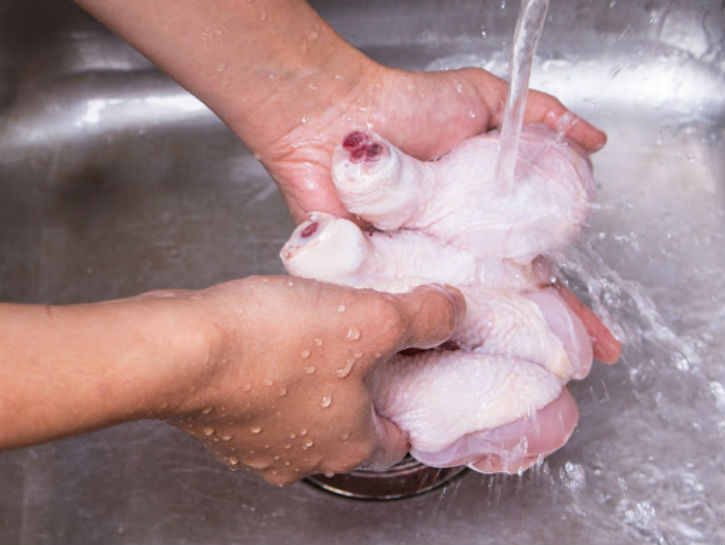In a classic episode of the PBS series Julia & Jacques Cooking At Home, famous chefs Julia Child and Jacques Pepin had a disagreement about washing raw chicken before roasting it. Child insisted that you need to wash the chicken before cooking, but Pepin said that the oven’s heat would kill all the germs. So, who was right?
According to Ina Garten, the Barefoot Contessa from the Food Network’s Cook Like A Pro, it was Pepin who was on the right side of the debate, and science can back him up. While recalling Child and Pepin’s debate on a chicken-themed episode of her show, Garten said that there is no need to wash chicken before putting it in the oven, and the scientific evidence shows that washing a chicken can spread harmful campylobacter bacteria.

Julia Child and Jacques Pepin disagreed on whether or not to wash raw chicken.
But she is not alone. Food health and safety professionals also advise skipping washing raw chicken, even though you might think you are washing away the germs and sliminess. If sliminess really is something you can’t get over, simply pat it down with a paper towel.
The splashing water from washing chicken under a tap can spread bacteria in all directions — to work surfaces and cooking equipment, and to your hands and clothes. It takes just a few campylobacter cells to cause food poisoning, and most cases of infection come from poultry. For about two to five days, campylobacter poisoning can cause severe diarrhea, tummy pain, and vomiting. And, in some cases, it can also lead to Guillain-Barre syndrome, irritable bowel syndrome, or reactive arthritis.
So how can you prevent campylobacter poisoning? The first step is to always cover and chill raw chicken and store it in the bottom of your refrigerator, so the juices won’t drip onto other food. Then, be sure to skip the washing, and instead just let the cooking kill any bacteria that is present.
Also, be sure to thoroughly wash the utensils you use while preparing the raw chicken, like knives, cutting boards, and any other surfaces. And after you handle the raw chicken, wash your hands with soap and warm water.

The USDA says that the only way to be sure that you are eliminating bacteria is to cook the meat to the proper temperature. So, when you are cooking chicken, make sure that it is steaming hot all the way through before you serve it. You can check by cutting into the thickest part of the meat to ensure that there is no pink meat and the juices are running clear.
With chicken, the minimum internal temperature for cooking is 165 degrees, no matter if it is fried, grilled, baked, or slow-cooked. It is the high-heat exposure that kills the bacteria.
So, if you want to avoid potential hazards, break the habit of washing raw chicken, and next time just take it straight from the refrigerator to the oven or frying pan. It may seem like you are breaking the rules of good hygiene, but in reality, not washing raw chicken is making your food safer.
